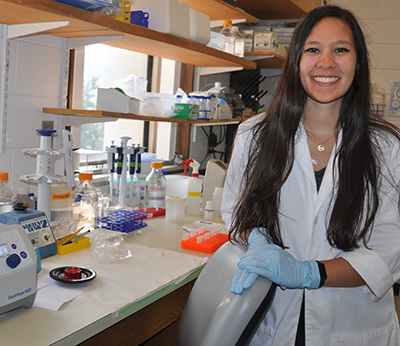
By the time she entered veterinary school at Iowa State University, Erica Moscoso had already checked off several items of her “to do” list.
Working at a small animal clinic – check.
Working at a wildlife refuge – check.
One thing Moscoso hadn’t checked off her list was assisting with a research project. Now after participating in the College of Veterinary Medicine’s Summer Scholar Research Program, she can add another checkmark to her list.
“A lot of my classmates had worked in a research lab as undergraduates,” Moscoso said. “Research just wasn’t one of the things I had ever looked into.
“All of my veterinary experience was on the clinical side.”
The Summer Scholar Research Program introduces veterinary medicine students like Moscoso to research in a wide array of areas. Through hands-on experiences, seminars and tours, students gain valuable perspectives on the numerous roles played by veterinarians in biomedical and public health research.
As a summer scholar in Dr. Matt Brewer’s, associate professor of veterinary pathology, lab, Moscoso has found out just how different research is from clinical practice.
“It’s been an eye-opening experience,” she said. “It’s allowed me to get out of comfort zone.”
In Brewer’s research lab, Moscoso has been assisting with the group’s project focused on a treatment option for Tritrichomonas foetus, a protozoan parasite known to be a pathogen of the bovine reproductive tract.
Tritrichomonas foetus is sexually transmitted and can cause infertility and spontaneous abortions in beef and dairy cattle. Brewer’s research group is currently testing a new possible treatment option known to kill the parasite.
During her summer scholar research experience, Moscoso has worked primarily in the lab, extracting DNA and running PCR tests as well as working with live animals at the Livestock Infectious Disease Isolation Facility. The experience she has gained through the Summer Scholar Research Program has proved invaluable.
“I’ve really enjoyed learning from everyone who is part of the parasitology team,” said Moscoso, who will continue to work in Brewer’s lab during her third year of veterinary school. “Dr. Brewer encourages and challenges us to always ask questions and try new things.”
August 2021
